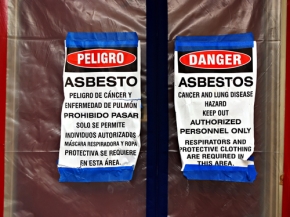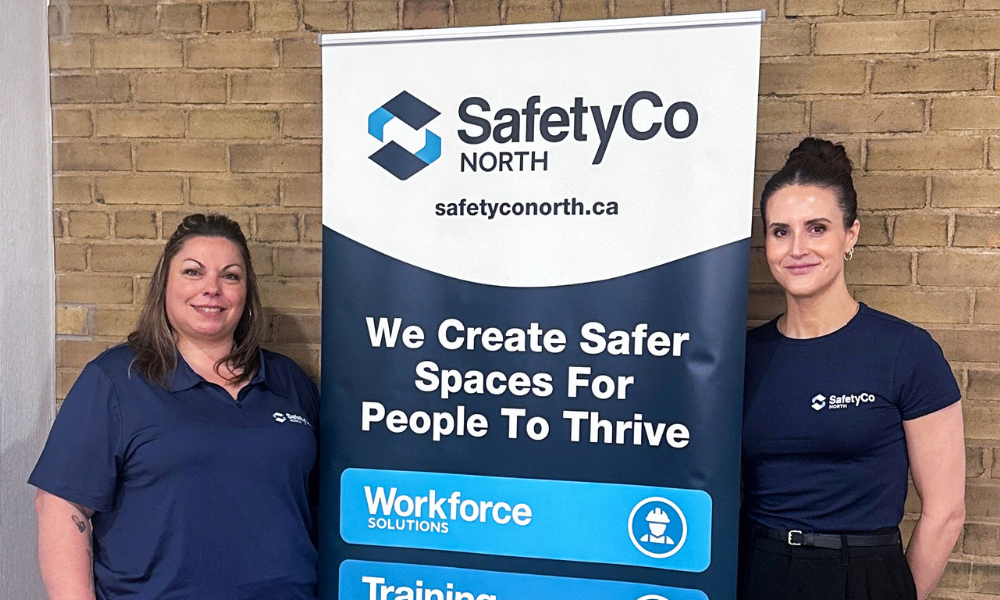
Anti-asbestos activists in Canada are working hard to get the government to heed calls to eradicate Canada's asbestos mining and export industries. They're making some headway and urge more entities to get involved, including occupational health and safety professionals.
Susanne Wilson’s husband Bob Auger died of mesothelioma in 2000 — a disease related to his working with asbestos as a college student nearly 40 years ago. Ever since Auger’s passing, Wilson has put plenty of energy into fighting Canada’s asbestos mining and trade industries.
She has made presentations about our country’s asbestos exports, pointing out that although the material — a fibrous insulating substance that, when airborne, lodges in the lungs causing serious health issues such as cancer — is effectively banned here in Canada, the federal government supports selling it elsewhere. She gives media interviews whenever possible, explaining that the government’s position that asbestos is safe if handled carefully, makes no sense; if Canada, a country with excellent health regulations, finds asbestos too dangerous to use at home, how can we expect people in countries with substantially less regulatory oversight to handle it safely?
“I buttonholed everybody I could — I didn’t care who it was,” Wilson says. “It has got to stop. It’s a horrible death. You can’t breathe. It crushes the heart and lung.”
She certainly isn’t the only Canadian raising the red flag on asbestos. Across the country, health professionals, safety experts and ordinary citizens are making their views known: Canada should cease and desist asbestos mining and export. Nonetheless, the government seems to ignore the message, and activists such as Wilson are calling on everyone — especially people in occupational health and safety positions — to add their voices to the anti-asbestos choir. (A COS Reader Poll asked health and safety professionals whether they support a total ban on mining and export of asbestos. Close to 80 per cent support a total ban on Canada's asbestos industry.)
So what can you do? Wilson and others say it’s time to write letters to members of Parliament, and it’s time to publicize the fact that, for many, Canada’s position on asbestos isn’t supportable. (Vote in our Reader Poll)
Asbestos certainly is a controversial substance. Reports have drawn connections between the material and lung diseases such as mesothelioma. While the asbestos industry touts the latest form of asbestos — chrysotile — as safer than other iterations, organizations such as the Sierra Club say chrysotile is still dangerous.
It’s no secret that Canada’s asbestos mines (such as those in Thetford Mines and Asbestos, Que.) produce a substantial amount of the material, and that much of it makes its way to factories in third-world countries like India, where workers don’t have the personal protective equipment and training required to work with it safely.
And it’s well known that the federal government supports the asbestos industry, reportedly providing funding for an asbestos marketing organization (the Chrysotile Institute). The Canadian government blocked the addition of asbestos to the Rotterdam Convention on Prior Informed Consent during a United Nations summit last June; under the Convention, exporters of listed materials have to tell importers about health hazards that the materials may cause.
Wilson says that if Canadians want this to stop, they have to speak up. She recommends writing to members of Parliament – particularly those belonging to the majority-ruling Conservative Party, the people who currently have the most power to effect change.
Letter to Leitch
Gilles Paradis has done just that. A professor at McGill University’s Department of Epidemiology, Biostatistics and Occupational Health, and editor of the Canadian Journal of Public Health, he participated in a letter from health and safety professionals sent to MP Kellie Leitch, representing Ontario’s Simcoe-Grey riding.
Leitch is a medical doctor, and as such, she has become one of the anti-asbestos league’s main targets, the idea being that Leitch’s oath to do no harm should compel her to oppose the government’s support for asbestos mining and export.
“As a public health physician, I thought it important that we conveyed our major concerns about Canada’s role in helping this industry, which should have no place in our economy, and we certainly shouldn’t be supporting an export that has a marginal impact in Canada but has major detrimental effects on populations worldwide,” Paradis says.
The letter, dated Aug. 18, calls on Leitch to side with the Canadian Medical Association, the Canadian Cancer Society, the Canadian Public Health Association and the World Health Organization to stop the use of asbestos.
“We congratulate you for the prestigious awards you have won in recognition of your leadership to promote public health, particularly the health of children,” the letter reads.
“We respectfully point out that it is incompatible to show leadership for the health of Canadian children and at the same time, to support a policy that causes harm to children in the developing world by placing asbestos in their homes and schools, particularly since no regulatory oversight is in place in these countries to protect people from asbestos harm once the asbestos is out in the community.”
This isn’t the only letter that representatives of the health and safety sector have sent to Leitch. But in an email response to Canadian Occupational Safety magazine, the parliamentarian sticks to her guns.
“I support the safe and controlled use of chrysotile within Canada,” Leitch says, adding that Minister of Natural Resources Joe Oliver would be better to address questions about the country’s asbestos exports.
Oliver didn’t respond by press time.
Paradis says anti-asbestos activists have a steep hill to climb. “It’s difficult to mobilize the general population around an issue that is essentially far away from our borders, and where there are some benefits for members of our community.” Asbestos produces jobs for people in Quebec, he points out. And when there are few local negatives — alongside some significant local positives — it can be difficult to convince people to make their objectives known.
Still, people across the country are speaking out, and organizations are taking notice.
Last year, anti-asbestos activists sent a letter to the Canadian Red Cross, pointing out to the disaster-relief organization that one of its directors — Roshi Chadha — is the executive of a company involved in the export of asbestos. Now, the Red Cross is reportedly reconsidering Chadha’s position on the board.
Encouraging reaction
Kathleen Ruff is a senior human-rights advisor to the Rideau Institute, and co-ordinator of RightOnCanada (http://www.rightoncanada.ca), a human-rights organization supporting an end to Canada’s asbestos mining and exports. She says the Red Cross’s reaction has been encouraging.
“They have responded with concern and caring. We are very hopeful that they will ask her to resign.”
What’s more, last year the public-interest research advocate Ken Rubin uncovered via access to information a memo from a Health Canada (HC) senior bureaucrat urging the federal government to add asbestos to the Rotterdam Convention.
“HC’s preferred position would be to list — as this is consistent with controlled use — i.e. let people know about the substance so they have the information they need, thru (sic) prior informed consent, to ensure they handle and use the substance correctly,” the memo reads.
Ruff says Health Canada’s point of view is far from earth shattering. “Its position was common sense: putting asbestos on the list is, in fact, in total conformity with what the government says its position is. The government says it supports safe, controlled use. Putting asbestos on the Rotterdam Convention ensures a minimal level for safe, controlled use.”
The memo may be a sign of things to come: bureaucrats refusing to kowtow to the government’s asbestos position. As Ruff notes, regional health directors (directeurs de santé publique, or DSPs) working for the Quebec government made their objectives known.
In a press release last March, they decried the government’s guarantee of a loan to revive an asbestos mine in Asbestos, Que., saying that asbestos should play no part in the future of the province.
“The concerns of the DSP are based, among other things, on the scientific production published by the National Institute of Public Health (INSPQ),” reads a translation of the press release provided by Ruff. “Mandated by the Department of Health and Social Services to monitor exposure to asbestos and the diseases that are linked to asbestos in the Quebec population and among workers, the INSPQ shows that there are significant difficulties in implementing the required safe-use measures.”
It’s a good sign that the health directors published that press release, Ruff says. “Here are public servants with the integrity to challenge their own government.”
If human-rights activists, health practitioners and ordinary citizens are compelled to speak out against the government’s asbestos position, occupational health and safety professionals should add their voices to the mix, according to the people we interviewed. After all, as Ruff says, OHS experts may well have the clout to convince the government that it’s time to reconsider Canada’s stance.
“They are seen as people who have credibility,” Ruff says of occupational health and safety professionals.
Anti-asbestos lobby’s contact list
Anti-asbestos activists say the government needs to reconsider its position supporting the mining and export of asbestos, and they want health and safety professionals to join the cause. Here are the contact co-ordinates for government representatives who may be able to effect change.
Stephen Harper
Prime Minister
Member of Parliament – Calgary Southwest
1600 – 90th Avenue SW, Suite A-203
Calgary, Alta.
T2V 5A8
[email protected]
403-253-7990, 613-992-4211
Kellie Leitch
Member of Parliament – Simcoe-Grey
23 Paris Street
Alliston, Ont.
L9R 1J3
[email protected]
705-435-1809, 613-992-4224
Joe Oliver
Minister of Natural Resources
Member of Parliament – Eglinton-Lawrence
511 Lawrence Ave. W.
Toronto, Ont.
M6A 1A3
[email protected]
416-781-5583, 613-992-6361
Christian Paradis
Minister of Industry, Minister of State (Agriculture)
Member of Parliament – Mégantic – L’Erable
1-1313 Frontenac Blvd. West
Thetford Mines, Que.
G6G 6K8
[email protected]
418-338-2903, 613-995-1377
Susanne Wilson’s husband Bob Auger died of mesothelioma in 2000 — a disease related to his working with asbestos as a college student nearly 40 years ago. Ever since Auger’s passing, Wilson has put plenty of energy into fighting Canada’s asbestos mining and trade industries.
She has made presentations about our country’s asbestos exports, pointing out that although the material — a fibrous insulating substance that, when airborne, lodges in the lungs causing serious health issues such as cancer — is effectively banned here in Canada, the federal government supports selling it elsewhere. She gives media interviews whenever possible, explaining that the government’s position that asbestos is safe if handled carefully, makes no sense; if Canada, a country with excellent health regulations, finds asbestos too dangerous to use at home, how can we expect people in countries with substantially less regulatory oversight to handle it safely?
“I buttonholed everybody I could — I didn’t care who it was,” Wilson says. “It has got to stop. It’s a horrible death. You can’t breathe. It crushes the heart and lung.”
She certainly isn’t the only Canadian raising the red flag on asbestos. Across the country, health professionals, safety experts and ordinary citizens are making their views known: Canada should cease and desist asbestos mining and export. Nonetheless, the government seems to ignore the message, and activists such as Wilson are calling on everyone — especially people in occupational health and safety positions — to add their voices to the anti-asbestos choir. (A COS Reader Poll asked health and safety professionals whether they support a total ban on mining and export of asbestos. Close to 80 per cent support a total ban on Canada's asbestos industry.)
So what can you do? Wilson and others say it’s time to write letters to members of Parliament, and it’s time to publicize the fact that, for many, Canada’s position on asbestos isn’t supportable. (Vote in our Reader Poll)
Asbestos certainly is a controversial substance. Reports have drawn connections between the material and lung diseases such as mesothelioma. While the asbestos industry touts the latest form of asbestos — chrysotile — as safer than other iterations, organizations such as the Sierra Club say chrysotile is still dangerous.
It’s no secret that Canada’s asbestos mines (such as those in Thetford Mines and Asbestos, Que.) produce a substantial amount of the material, and that much of it makes its way to factories in third-world countries like India, where workers don’t have the personal protective equipment and training required to work with it safely.
And it’s well known that the federal government supports the asbestos industry, reportedly providing funding for an asbestos marketing organization (the Chrysotile Institute). The Canadian government blocked the addition of asbestos to the Rotterdam Convention on Prior Informed Consent during a United Nations summit last June; under the Convention, exporters of listed materials have to tell importers about health hazards that the materials may cause.
Wilson says that if Canadians want this to stop, they have to speak up. She recommends writing to members of Parliament – particularly those belonging to the majority-ruling Conservative Party, the people who currently have the most power to effect change.
Letter to Leitch
Gilles Paradis has done just that. A professor at McGill University’s Department of Epidemiology, Biostatistics and Occupational Health, and editor of the Canadian Journal of Public Health, he participated in a letter from health and safety professionals sent to MP Kellie Leitch, representing Ontario’s Simcoe-Grey riding.
Leitch is a medical doctor, and as such, she has become one of the anti-asbestos league’s main targets, the idea being that Leitch’s oath to do no harm should compel her to oppose the government’s support for asbestos mining and export.
“As a public health physician, I thought it important that we conveyed our major concerns about Canada’s role in helping this industry, which should have no place in our economy, and we certainly shouldn’t be supporting an export that has a marginal impact in Canada but has major detrimental effects on populations worldwide,” Paradis says.
The letter, dated Aug. 18, calls on Leitch to side with the Canadian Medical Association, the Canadian Cancer Society, the Canadian Public Health Association and the World Health Organization to stop the use of asbestos.
“We congratulate you for the prestigious awards you have won in recognition of your leadership to promote public health, particularly the health of children,” the letter reads.
“We respectfully point out that it is incompatible to show leadership for the health of Canadian children and at the same time, to support a policy that causes harm to children in the developing world by placing asbestos in their homes and schools, particularly since no regulatory oversight is in place in these countries to protect people from asbestos harm once the asbestos is out in the community.”
This isn’t the only letter that representatives of the health and safety sector have sent to Leitch. But in an email response to Canadian Occupational Safety magazine, the parliamentarian sticks to her guns.
“I support the safe and controlled use of chrysotile within Canada,” Leitch says, adding that Minister of Natural Resources Joe Oliver would be better to address questions about the country’s asbestos exports.
Oliver didn’t respond by press time.
Paradis says anti-asbestos activists have a steep hill to climb. “It’s difficult to mobilize the general population around an issue that is essentially far away from our borders, and where there are some benefits for members of our community.” Asbestos produces jobs for people in Quebec, he points out. And when there are few local negatives — alongside some significant local positives — it can be difficult to convince people to make their objectives known.
Still, people across the country are speaking out, and organizations are taking notice.
Last year, anti-asbestos activists sent a letter to the Canadian Red Cross, pointing out to the disaster-relief organization that one of its directors — Roshi Chadha — is the executive of a company involved in the export of asbestos. Now, the Red Cross is reportedly reconsidering Chadha’s position on the board.
Encouraging reaction
Kathleen Ruff is a senior human-rights advisor to the Rideau Institute, and co-ordinator of RightOnCanada (http://www.rightoncanada.ca), a human-rights organization supporting an end to Canada’s asbestos mining and exports. She says the Red Cross’s reaction has been encouraging.
“They have responded with concern and caring. We are very hopeful that they will ask her to resign.”
What’s more, last year the public-interest research advocate Ken Rubin uncovered via access to information a memo from a Health Canada (HC) senior bureaucrat urging the federal government to add asbestos to the Rotterdam Convention.
“HC’s preferred position would be to list — as this is consistent with controlled use — i.e. let people know about the substance so they have the information they need, thru (sic) prior informed consent, to ensure they handle and use the substance correctly,” the memo reads.
Ruff says Health Canada’s point of view is far from earth shattering. “Its position was common sense: putting asbestos on the list is, in fact, in total conformity with what the government says its position is. The government says it supports safe, controlled use. Putting asbestos on the Rotterdam Convention ensures a minimal level for safe, controlled use.”
The memo may be a sign of things to come: bureaucrats refusing to kowtow to the government’s asbestos position. As Ruff notes, regional health directors (directeurs de santé publique, or DSPs) working for the Quebec government made their objectives known.
In a press release last March, they decried the government’s guarantee of a loan to revive an asbestos mine in Asbestos, Que., saying that asbestos should play no part in the future of the province.
“The concerns of the DSP are based, among other things, on the scientific production published by the National Institute of Public Health (INSPQ),” reads a translation of the press release provided by Ruff. “Mandated by the Department of Health and Social Services to monitor exposure to asbestos and the diseases that are linked to asbestos in the Quebec population and among workers, the INSPQ shows that there are significant difficulties in implementing the required safe-use measures.”
It’s a good sign that the health directors published that press release, Ruff says. “Here are public servants with the integrity to challenge their own government.”
If human-rights activists, health practitioners and ordinary citizens are compelled to speak out against the government’s asbestos position, occupational health and safety professionals should add their voices to the mix, according to the people we interviewed. After all, as Ruff says, OHS experts may well have the clout to convince the government that it’s time to reconsider Canada’s stance.
“They are seen as people who have credibility,” Ruff says of occupational health and safety professionals.
Anti-asbestos lobby’s contact list
Anti-asbestos activists say the government needs to reconsider its position supporting the mining and export of asbestos, and they want health and safety professionals to join the cause. Here are the contact co-ordinates for government representatives who may be able to effect change.
Stephen Harper
Prime Minister
Member of Parliament – Calgary Southwest
1600 – 90th Avenue SW, Suite A-203
Calgary, Alta.
T2V 5A8
[email protected]
403-253-7990, 613-992-4211
Kellie Leitch
Member of Parliament – Simcoe-Grey
23 Paris Street
Alliston, Ont.
L9R 1J3
[email protected]
705-435-1809, 613-992-4224
Joe Oliver
Minister of Natural Resources
Member of Parliament – Eglinton-Lawrence
511 Lawrence Ave. W.
Toronto, Ont.
M6A 1A3
[email protected]
416-781-5583, 613-992-6361
Christian Paradis
Minister of Industry, Minister of State (Agriculture)
Member of Parliament – Mégantic – L’Erable
1-1313 Frontenac Blvd. West
Thetford Mines, Que.
G6G 6K8
[email protected]
418-338-2903, 613-995-1377





